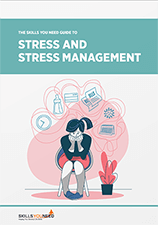How to De-Stress While Doing Better at Work
See also: Workplace StressIf you’re like many people, your work is one of the primary sources of stress in your life.
From managing deadlines to juggling work demands and career goals with your home and family, finding the right balance between staying stress-free while still pursuing your goals is a challenge.
In fact, problems at work can lead to anxiety and depression if stress is not well-managed. Some say that you can’t ever truly have it all, but you can find ways to de-stress while still excelling at your job.
Embrace the Power of Planning and Prioritizing
One of the most effective ways to get a handle on your workload while minimizing stress is to plan and organize everything.
Write to-do lists that outline major projects with an individual task breakdown. Plan enough time to complete each task so that you’re not crunched for time.

There are tons of ways to prioritize your work and family life, too. You might decide to prioritize the tasks that you tend to procrastinate first so that you get the least enjoyable tasks out of the way, or you might prioritize by deadline or importance. Find a way to prioritize your workload so that you can easily determine which tasks to complete first.
Commit to Simplicity: De-Clutter Your Home and Office Space
Too many distractions can hinder your productivity and lead to increased stress.
Many busy professionals find that simplifying all facets of their lives dramatically reduces stress. Keep your home and office free of distracting clutter, eliminate the things you don’t need, and don’t overcommit yourself.
Simplifying your work and home life makes it easier to prioritize and eliminates distractions that can shift your focus from the important tasks at hand to less-important demands that can wait until later.
See our pages: Minimising Distractions and Time Wasters and Avoiding Procrastination for more on this.
Define What Balance Means to You and Create Boundaries
For some, balance may mean leaving the office at 5:00 p.m. and not thinking about work again until the next day. For others, it means having the flexibility to attend to personal and family needs and being able to make up the time later to deal with work commitments.
The first step to de-stressing while excelling at work is to determine exactly what your ideal balance looks like.
From there, you can set boundaries. If you choose to dedicate weekends to spend with your family, make it clear that you will not respond to emails or answer work-related calls until the next business day. Setting clear boundaries and sticking to them means the time you’ve set aside to rest and recharge is truly yours. Don’t deviate from your boundaries except in true emergencies; giving in even once to a minor work call on the weekends could set a precedent for the future. Talk to your subordinates what constitutes an emergency and what can wait until Monday.
See our page: Work-Life Balance for more information.
Work Smarter Instead of Harder
Learning to delegate effectively can greatly reduce stress both at work and at home.
For instance, if you find it difficult to find time to clean your home every week due to work and family demands, hire a cleaning professional to do it for you. Often, you’ll find that the time you save on the tasks that don’t really need to be done by you is well worth the cost and can help you gain productivity – and maybe even boost your income – in other areas.
Working smarter instead of harder also means finding more efficient ways to get things done.
If you have to discuss an upcoming project with your team at work, but getting everyone in the same room means booking a flight to the home office, use strategies to make communication effective without adding the unnecessary stress of travel and time spent away from your family. Holding conference calls, for instance, is one way to achieve the same goals without the hassle of face-to-face meetings.
Take Your Lunch Break with co-workers
First, avoid having a working lunch stuck behind your desk.
Meals are a lot less satisfying if you’re trying to balance working and eating, and skipping your break may actually increase your fatigue and decrease productivity. Besides, nothing puts a damper on your day like spilling that leftover gumbo all over your keyboard.
Instead, eat lunch with your co-workers in the break room, at picnic tables outside the office, or at a nearby restaurant. It’ll give you a better chance to connect with your colleagues, making work feel a little more familiar and comfortable. And your brain will thank you for the break from being stuck in work mode for eight hours straight!
Feeling Stuck? Change Things Up
When you’ve been at it for hours, sometimes the creative juices just stop flowing.
Instead of sitting and staring at the screen in the hopes of a lightning strike of inspiration, get up and get out. Go for a walk or grab a cup of coffee from the food truck out front, just do something that changes your environment. Giving your senses a change in stimulation can reduce stress hormones and rewire your brain to relax, allowing your creative muscle to recharge.
If your boss isn’t keen on you making field trips, grab your phone and earbuds and go for a walk around the office while listening to your favorite song. Head to the water cooler for a drink and take some deep breaths between sips. Think ahead to your exciting weekend plans, or that family vacation that’s only a few weeks away. Send your spouse a quick text just to say you’re thinking of them.
Distract your mind from the task at hand and shift the focus to a dose of happy. By the time you make it back to your desk, your assignment won’t seem so daunting and you’ll be ready to dive back in and knock it out.
Further Reading from Skills You Need
The Skills You Need Guide to Stress and Stress Management
Understand and Manage Stress in Your Life
Learn more about the nature of stress and how you can effectively cope with stress at work, at home and in life generally. The Skills You Need Guide to Stress and Stress Management eBook covers all you need to know to help you through those stressful times and become more resilient.
There’s no denying that balancing work and family is stressful. While you won’t be able to avoid every stressful work scenario or the stress of having to skip a child’s practice to meet a deadline, you can achieve greater balance and reduce stress by finding ways to work smarter, prioritize, and create boundaries that allow you to focus your efforts where it counts.
About the Author
Jennifer Scott is a lifelong sufferer of anxiety and depression. When she isn’t working on her website, she enjoys traveling, working with animals, and seeking out new friendships and adventures.
Continue to:
Avoiding and Managing Stress
Avoiding Burnout
See also:
Organising Skills | Strategic Thinking | Action Planning


